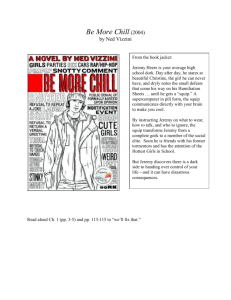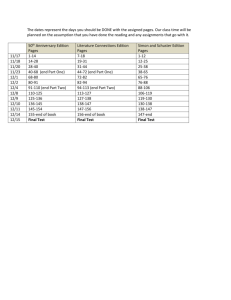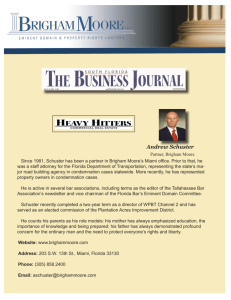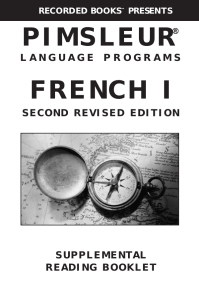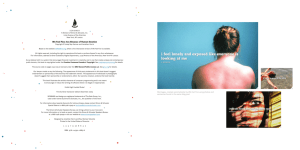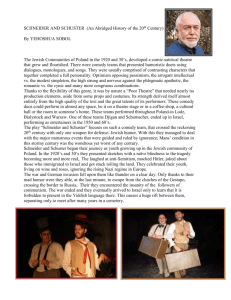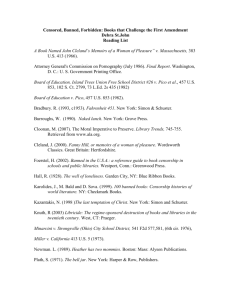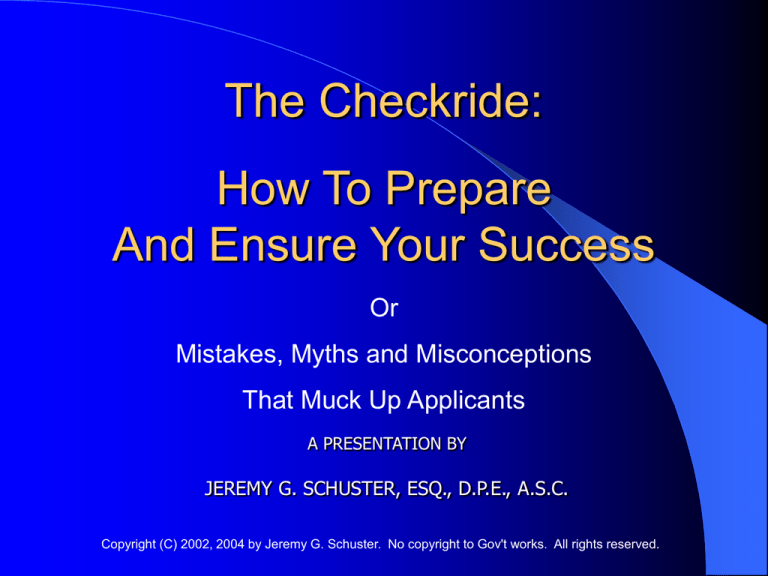
The Checkride:
How To Prepare
And Ensure Your Success
Or
Mistakes, Myths and Misconceptions
That Muck Up Applicants
A PRESENTATION BY
JEREMY G. SCHUSTER, ESQ., D.P.E., A.S.C.
Copyright (C) 2002, 2004 by Jeremy G. Schuster. No copyright to Gov't works. All rights reserved.
The Checkride
What is it?
Myth: A test the FAA uses to keep you from
flying.
Mistake: A flight lesson with a person who
knows everything.
Truth: An observation and evaluation of
certain knowledge and skills at a particular
point in time.
Copyright (C) 2002, 2004 by Jeremy G. Schuster. No copyright to Gov't works. All rights reserved.
Who Gives The Checkride?
FAA (Staff)
Inspector;
Designated Pilot Examiner (DPE): An
individual who has been granted
examination authority by the FAA.
Note: A DPE cannot train you, endorse
you and give you a checkride without
special permission from the FAA.
Copyright (C) 2002, 2004 by Jeremy G. Schuster. No copyright to Gov't works. All rights reserved.
What Criteria Are Used?
It’s no secret …
The Practical Test Standards (PTS)
define the tasks that must be performed
for the license or rating sought and the
parameters for acceptable performance.
The PTS should be the “bible” for
instructor, student, applicant, examiner
and inspector.
Copyright (C) 2002, 2004 by Jeremy G. Schuster. No copyright to Gov't works. All rights reserved.
Three Potential Results
There are only three potential outcomes
or results from a checkride:
1. Issuance of license or rating;
2. Notice of disapproval;
3. Notice of discontinuance.
Copyright (C) 2002, 2004 by Jeremy G. Schuster. No copyright to Gov't works. All rights reserved.
Pass v. Fail
Myth: The system is designed to ensure that
you “fail.”
Truth: The majority of applicants prepare
well; they perform within applicable standards
and receive a new license or rating after their
checkride.
As an average, 85% of applicants perform
within applicable standards – that means
fewer than 2 of every 10 do not meet the
standards during their checkride.
Copyright (C) 2002, 2004 by Jeremy G. Schuster. No copyright to Gov't works. All rights reserved.
Pass v. Fail
Myth: You lose everything if you fail to
meet the test standards.
Truth: You receive credit for every task
performed within test standards; your
credits can be carried forward for up to
60 days, to allow you to prepare for and
complete a re-exam.
Copyright (C) 2002, 2004 by Jeremy G. Schuster. No copyright to Gov't works. All rights reserved.
Inspector’s/Examiner’s Role
To provide a fair and impartial evaluation of
pilot knowledge and performance
Applicant’s Role
To
demonstrate knowledge and skills in
accordance with the PTS
Copyright (C) 2002, 2004 by Jeremy G. Schuster. No copyright to Gov't works. All rights reserved.
Who Runs The Show?
•
The applicant has the ability to “run the
checkride” if he/she is well-prepared,
understands the test requirements, and
has a plan for demonstration.
Copyright (C) 2002, 2004 by Jeremy G. Schuster. No copyright to Gov't works. All rights reserved.
Who Runs The Show?
During
the checkride, the applicant
is the Pilot In Command and is
fully-responsible for the safe
operation of the aircraft.
Copyright (C) 2002, 2004 by Jeremy G. Schuster. No copyright to Gov't works. All rights reserved.
Who Runs The Show?
The
inspector/examiner will typically
defer to the applicant who demonstrates
complete command and control of the
aircraft.
The majority of private pilot applicants
fail to take advantage and wait for the
inspector/examiner to dictate to him/her.
Copyright (C) 2002, 2004 by Jeremy G. Schuster. No copyright to Gov't works. All rights reserved.
Designated Pilot Examiner
Is A Safety-Conscious
Evaluator
Paid By You To Perform A Public
Service (evaluation of tests)
DPEs Service A Defined Region
(Particular FSDO or FSDOs)
DPEs Work At The Pleasure Of The
FAA Administrator
Copyright (C) 2002, 2004 by Jeremy G. Schuster. No copyright to Gov't works. All rights reserved.
Designated Pilot Examiner
Typically
a pilot who is very
accomplished in many areas of
operation, including prior service as an
instructor, flight check airman, or
evaluator.
Approximately 1,200 nationwide.
List Of Area DPEs available through
local FSDO website.
Copyright (C) 2002, 2004 by Jeremy G. Schuster. No copyright to Gov't works. All rights reserved.
Choosing A DPE
Discuss
potential candidates with your
instructor and other pilots
Contact DPEs to determine availability,
fees, feel out personalities and
review Plan of Action (POA) (if possible)
Choose an examiner according to your
level of comfort with him/her.
Copyright (C) 2002, 2004 by Jeremy G. Schuster. No copyright to Gov't works. All rights reserved.
Cost Of Checkride
With
FAA Inspector: Zero (the service is
paid for indirectly through taxes).
With
DPE: A reasonable fee (fees are
not regulated by the FAA or FSDOs, but
are typically maintained by community
standard).
Copyright (C) 2002, 2004 by Jeremy G. Schuster. No copyright to Gov't works. All rights reserved.
Cost Of Checkride
Southern California DPEs: typical range is
$300 - $450 dollars for checkride, dependent
upon type of license or rating sought.
Some examiners charge appointment or
reservation fee; some have cancellation
charges.
Rechecks: Costs range from zero to full-price
for recheck; many examiners charge a
reduced fee.
Form of Payment: DPE sets his/her own
policy.
Copyright (C) 2002, 2004 by Jeremy G. Schuster. No copyright to Gov't works. All rights reserved.
Practical Test Standards
EVERY task and performance requirement is
contained in the PTS – this includes the Wx
section effective 08/01/2002.
There should not be any surprises:
You will not be asked to demonstrate any
knowledge or perform any task not
contained in the PTS.
Copyright (C) 2002, 2004 by Jeremy G. Schuster. No copyright to Gov't works. All rights reserved.
Practical Test Standards
The
FAA encourages you to use the
PTS prior to the checkride.
Failure
to read or familiarize yourself
with the PTS shows a lack of serious
interest and commitment.
Copyright (C) 2002, 2004 by Jeremy G. Schuster. No copyright to Gov't works. All rights reserved.
How Should You Prepare?
Start
with the PTS!
Familiarize yourself with the PTS
Discuss it with your instructor
Study the knowledge areas required
Use PTS to evaluate your performance
of required tasks.
Copyright (C) 2002, 2004 by Jeremy G. Schuster. No copyright to Gov't works. All rights reserved.
How Should You Prepare?
Complete
8710-1 Form correctly; obtain
all necessary endorsements
Mark logbook (paper clips, Post-It, etc.)
to indicate required experience
Check equipment/supplies
Obtain any necessary fees (check, etc.)
Copyright (C) 2002, 2004 by Jeremy G. Schuster. No copyright to Gov't works. All rights reserved.
The Examiner/Inspector Should
Treat
you professionally and
courteously;
Provide fair and impartial evaluation;
Issue license, rating, notice of
disapproval or notice of discontinuance,
as applicable.
Copyright (C) 2002, 2004 by Jeremy G. Schuster. No copyright to Gov't works. All rights reserved.
Expectations:
•
Depth of knowledge
- Rote memorization
- Comprehension/understanding
- Application
- Correlation
- Insights (see Instructor Handbook)
Copyright (C) 2002, 2004 by Jeremy G. Schuster. No copyright to Gov't works. All rights reserved.
Common Mistakes
Prior To Checkride:
• Failure to prepare adequately
•
•
•
•
•
Lack of organization
8710-1 not completed correctly
Applicant not endorsed properly for test
Aircraft not “airworthy”
Lack of of knowledge (or depth)
Copyright (C) 2002, 2004 by Jeremy G. Schuster. No copyright to Gov't works. All rights reserved.
Flee, Fly or Discontinue?
•
The applicant must decide whether or not to
begin the checkride – and, at times, whether
to continue it.
• The examiner may consider the applicant’s
evaluation and decision-making processes as
part of the checkride.
Example: It was sunny and clear while you
answered oral questions, but now there is
rain and limited visibility – what do you do?
Copyright (C) 2002, 2004 by Jeremy G. Schuster. No copyright to Gov't works. All rights reserved.
Flee, Fly or Discontinue?
“ Do not let yourself be forced
into doing anything before
you are ready. ”
—Wilbur Wright
Copyright (C) 2002, 2004 by Jeremy G. Schuster. No copyright to Gov't works. All rights reserved.
Rote Response
What type of engine does your plane have?
Rote response: “An LIO-360-200”
This response begs the examiner to question
further, to determine if the applicant has
sufficient depth of knowledge.
Next question: What does LIO-360-200 mean?
Copyright (C) 2002, 2004 by Jeremy G. Schuster. No copyright to Gov't works. All rights reserved.
Potentially Sufficient Response
“A four cylinder, 200 horsepower, fuel
injected piston engine made by
Lycoming.”
This answer, while not comprehensive,
appears complete and in plain English,
without codes (L-I-O, etc.).
Copyright (C) 2002, 2004 by Jeremy G. Schuster. No copyright to Gov't works. All rights reserved.
It Happens All The Time
Q: How many volts is your electrical system?
A: 38
Q: If you are exposed to bright light before a
night flight, how long does it take your eyes to
adjust so you can see detail, read maps?
A: They adjust immediately.
Q: How does the landing gear operate?
A: Very well, sir.
Copyright (C) 2002, 2004 by Jeremy G. Schuster. No copyright to Gov't works. All rights reserved.
Oral Exam: Discretionary Limits
The PTS requires you to exhibit knowledge.
The examiner has some discretion, but:
“ .... If the applicant consistently
gives incorrect, confused or
unrelated answers to the
examiner's questions, the examiner
must terminate the test and issue a
notice of disapproval.”
Pilot Examiner’s Handbook, 8710.3C, 5-5/19-(2)
Copyright (C) 2002, 2004 by Jeremy G. Schuster. No copyright to Gov't works. All rights reserved.
Even DPEs Make Mistakes
Q: When Is Oxygen Required?
A: Always
Although the question was intended to
determine whether the applicant knew when
use of “supplemental oxygen” is required, it
was too vague or poorly framed, causing the
examiner to ask the question in another way.
Copyright (C) 2002, 2004 by Jeremy G. Schuster. No copyright to Gov't works. All rights reserved.
Oral Exam: It Ain’t Over ‘Til …
Although the practical test is principally
organized into two portions (oral and
flight test), oral questions may be asked
at any time until the entire test is
completed.
Often, questions are asked in flight as a
method of distraction.
Copyright (C) 2002, 2004 by Jeremy G. Schuster. No copyright to Gov't works. All rights reserved.
Common Mistakes
During Flight:
• Failure to control/command aircraft
• Fixation errors
• Asking the examiner questions during the
checkride, such as “how should I handle
this?”
• Failure to respond to examiner’s questions.
Copyright (C) 2002, 2004 by Jeremy G. Schuster. No copyright to Gov't works. All rights reserved.
Common Mistakes
During Flight:
• Poor decision-making (“I think I can stop
before the end of the runway”)
• Pilot becoming distracted (failure to control
aircraft, observe other aircraft, etc.)
• Lack of knowledge (airspace, what to do in
emergency, etc.)
• “Flying wide”
Copyright (C) 2002, 2004 by Jeremy G. Schuster. No copyright to Gov't works. All rights reserved.
Satisfactory Performance
• Perform the approved areas of operation
… within the approved standards (PTS);
• Demonstrate mastery of the aircraft with
the successful outcome of each task
performed never seriously in doubt;
• Demonstrate sound judgment.
Copyright (C) 2002, 2004 by Jeremy G. Schuster. No copyright to Gov't works. All rights reserved.
AUTOMATIC DISAPPROVAL
Failure to observe:
• Clearances, procedures, regulations
Copyright (C) 2002, 2004 by Jeremy G. Schuster. No copyright to Gov't works. All rights reserved.
AUTOMATIC DISAPPROVAL
Failure to observe:
• Clearances, procedures, regulations
Copyright (C) 2002, 2004 by Jeremy G. Schuster. No copyright to Gov't works. All rights reserved.
AUTOMATIC DISAPPROVAL
Failure to observe:
• Other aircraft, potential hazards (collision
avoidance procedures, etc.)
Copyright (C) 2002, 2004 by Jeremy G. Schuster. No copyright to Gov't works. All rights reserved.
AUTOMATIC DISAPPROVAL?
Copyright (C) 2002, 2004 by Jeremy G. Schuster. No copyright to Gov't works. All rights reserved.
AUTOMATIC DISAPPROVAL?
Copyright (C) 2002, 2004 by Jeremy G. Schuster. No copyright to Gov't works. All rights reserved.
THE BAD NEWS
Unfortunately, there are no “re-dos.”
An examiner may request you to repeat a
maneuver when:
• Examiner is unsure of what he/she saw
• Maneuver was discontinued for safety
reasons (i.e., to avoid traffic)
but this is the examiner’s option, not
yours.
Copyright (C) 2002, 2004 by Jeremy G. Schuster. No copyright to Gov't works. All rights reserved.
IT AIN’T OVER ‘TIL …
Copyright (C) 2002, 2004 by Jeremy G. Schuster. No copyright to Gov't works. All rights reserved.
IT AIN’T OVER ‘TIL …
The checkride is not completed until after
you park and secure the aircraft.
Remember to:
• Taxi cautiously, at an appropriate speed;
• Request progressives if necessary;
• Avoid “hot-dogging” into parking spaces;
• Use shutdown checklist .
Copyright (C) 2002, 2004 by Jeremy G. Schuster. No copyright to Gov't works. All rights reserved.
7 Steps To Ensure Success
•
•
•
•
•
•
•
Dress neatly (not a req’t, but it helps)
Be prompt: arrive on-time or early
Be prepared: all documents, I.D., fee, etc.
Be professional: treat the examiner as you
wish to be treated (respect, courtesy, etc.)
Brief DPE prior to flight; use checklists;
Speak clearly and loudly enough to be heard
Fly safely and within PTS standards.
Copyright (C) 2002, 2004 by Jeremy G. Schuster. No copyright to Gov't works. All rights reserved.
Prejudice Has No Place Here
The Mandate:
An examiner shall not allow personal
prejudices to interfere with objective
evaluation … if a personality conflict or
disagreement develops … prior to
any unsatisfactory performance …
the examiner or applicant may
discontinue the practical test.
Copyright (C) 2002, 2004 by Jeremy G. Schuster. No copyright to Gov't works. All rights reserved.
Thank You For Attending
This
seminar qualifies under the WINGS
program as a safety presentation.
Have your WINGS application endorsed
before you leave!
Copyright (C) 2002, 2004 by Jeremy G. Schuster. No copyright to Gov't works. All rights reserved.

